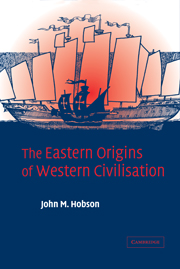Book contents
- Frontmatter
- Contents
- List of tables
- Preface and acknowledgements
- Map: Hobo-Dyer projection of the world
- 1 Countering the Eurocentric myth of the pristine West: discovering the oriental West
- I The East as an early developer: the East discovers and leads the world through oriental globalisation, 500–1800
- 2 Islamic and African pioneers: building the Bridge of the World and the global economy in the Afro-Asian age of discovery, 500–1500
- 3 Chinese pioneers: the first industrial miracle and the myth of Chinese isolationism, c. 1000–1800
- 4 The East remains dominant: the twin myths of oriental despotism and isolationism in India, South-east Asia and Japan, 1400–1800
- II The West was last: oriental globalisation and the invention of Christendom, 500–1498
- III The West as a late developer and the advantages of backwardness: oriental globalisation and the reconstruction of Western Europe as the advanced West, 1492–1850
- IV Conclusion: the oriental West versus the Eurocentric myth of the West
- Notes
- Index
2 - Islamic and African pioneers: building the Bridge of the World and the global economy in the Afro-Asian age of discovery, 500–1500
Published online by Cambridge University Press: 22 September 2009
- Frontmatter
- Contents
- List of tables
- Preface and acknowledgements
- Map: Hobo-Dyer projection of the world
- 1 Countering the Eurocentric myth of the pristine West: discovering the oriental West
- I The East as an early developer: the East discovers and leads the world through oriental globalisation, 500–1800
- 2 Islamic and African pioneers: building the Bridge of the World and the global economy in the Afro-Asian age of discovery, 500–1500
- 3 Chinese pioneers: the first industrial miracle and the myth of Chinese isolationism, c. 1000–1800
- 4 The East remains dominant: the twin myths of oriental despotism and isolationism in India, South-east Asia and Japan, 1400–1800
- II The West was last: oriental globalisation and the invention of Christendom, 500–1498
- III The West as a late developer and the advantages of backwardness: oriental globalisation and the reconstruction of Western Europe as the advanced West, 1492–1850
- IV Conclusion: the oriental West versus the Eurocentric myth of the West
- Notes
- Index
Summary
If as a philosopher one wishes to instruct oneself about what has taken place on the globe, one must first of all turn one's eyes towards the East, the cradle of all arts, to which the West owes everything.
VoltaireWestern scholars, at least since the nineteenth century, have tried to find ways of seeing [the] Afro-Eurasian zone of civilization as composed of distinct historical worlds … one convenient result [of which] would be to leave Europe … with a history that need not be integrated with that of the rest of mankind save on the terms posed by European history itself … [But after] 500 ad there was occurring a cumulative improvement in technique, especially in military and even financial [institutions]; the range of commerce expanded, as in sub-Saharan Africa which now effectively entered the Afro-Eurasian area of civilization … [Because] the interactions among regions – as a result of Islam, or of the Mongols, or of scientific or artistic borrowing [etc.] – were so frequent, and involved … China and … Western Europe [this necessarily means] that these developments [in technique] cannot be fully disengaged from each other.
Marshall HodgsonThe standard picture of the world before 1500 presented by Eurocentrism comprises two core features: first, a world mired in so-called stagnant ‘tradition’; and second, a fragmented world divided between insulated and backward regional civilisations that were governed by ‘irrational’ despotic states (mainly in the East).
- Type
- Chapter
- Information
- The Eastern Origins of Western Civilisation , pp. 29 - 49Publisher: Cambridge University PressPrint publication year: 2004



